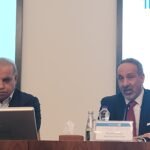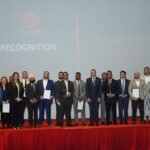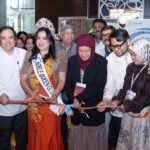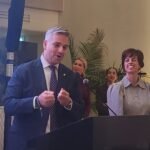Doha, 02 May 2024 (QNA)
Chairman of the Council of Presidents of the United Nations General Assembly Dr. Han Seung-soo affirmed that Qatar plays significant roles on both regional and international stages, especially in issues related to conflict resolution and various conflicts.
He highlighted Qatar's exceptional capability in hosting major sports tournaments and cited the development of the country's media, expressing hope that Qatar will continue to fulfill these important roles in the future.
In exclusive remarks to Qatar News Agency (QNA), he said that meeting of the Council of Presidents of the United Nations General Assembly, currently hosted in Doha over two days, is a gathering of former Presidents of the General Assembly who were involved in various global issues during their tenure at the United Nations. He noted that this meeting occurs twice a year, and the Doha meeting is the fourth since the Council's revival in 2022.
He emphasized that the Doha Council meeting aims to discuss several current global issues, including developments in Gaza, the situation in Ukraine, cybersecurity, and artificial intelligence. He added that they will discuss the forthcoming Summit of the Future at the beginning of the next session of the United Nations General Assembly, scheduled for September.
The Meeting of the Council of Presidents of the United Nations General Assembly (UNCPGA), hosted by the State of Qatar, kicked off Thursday, chaired by Chairman of the Council of Presidents of the United Nations General Assembly, Dr. Han Seung-soo.
Addressing the inaugural session, Minister of State for Foreign Affairs of State of Qatar, Sultan bin Saad Al Muraikhi, said that the State of Qatar's unwavering support for the Office of the UNGA President reflects its commitment to the UN goals, expressing his aspiration to adopt the Doha Declaration as the final document of the meeting.
Following is the keynote speech of Dennis Francis, President of the General Assembly in Doha on 2nd May 2024 at the Meeting of the Council of Presidents of UNCPGA
Your Excellency, Soltan bin Saad Al-Muraikhi, Minister of State for Foreign Affairs of the State of Qatar,
Your Excellency, Dr Han Seung-soo, Chair of UNCPGA,
Your Excellencies, esteemed members of UNCPGA,
Dr Jehangir Khan, Secretary-General of UNCPGA,
Ladies and Gentlemen,
It is with a profound sense of gratitude and encouragement that I join you – for the second time during my tenure – at the Annual Meeting of this esteemed Council of Presidents of the United Nations General Assembly (UNCPGA).
I should like to commend Your Excellency, Dr Han Seung-soo, for your exemplary leadership as Chairman of this Council – stewardship that commands both our respect and admiration, at a time of increasing uncertainty and indeed instability in the international system.
Permit me also to extend a special thank you to the State of Qatar, and particularly, to our dear Colleague, former President Nassir Abdulaziz Al-Nasser, for their exceptional generosity in hosting us and their kind support in bringing us together at this meeting.
My words of appreciation would be quite incomplete if I do not also acknowledge and indeed thank our devoted Secretary-General, Dr Jehangir Khan – whose tireless efforts have been instrumental in steering this platform toward a most fruitful open dialogue and strengthened collaboration with my office.
Chair, and Dear Colleagues,
As we gather here today, I look forward to your reflections broadly on two main points:
-the severe challenges facing our multilateral system – challenges that raise existential questions about its legitimacy, its ability to foster solidarity and to enact progress,
-and secondly and more importantly, on the opportunities that empower leaders to galvanize international efforts towards a brighter future.
Nine months into my Presidency, the polarization among Member States echoes the geopolitical fractures of yesteryears – and divisions that were once mere cracks continue to widen, forming gaping chasms.
As stated during our meeting in Seoul last October, my Presidency has been guided by four pillars: peace, progress, prosperity, and sustainability for all.
It has since become increasingly evident that – of these four – peace simultaneously constitutes both the foundation and the fragility of our collective endeavors.
When prevalent, peace is the great enabler of progress, prosperity, and sustainability – while its absence is the greatest obstacle to the achievement of those critical objectives.
Though tragically not the only challenges we face – with escalating crises in Sudan and Haiti, and the severe erosion of women’s rights in Afghanistan – the growing fractures of our world are starkly displayed in the humanitarian catastrophes both in Ukraine and Gaza.
In Ukraine, blatant disregard for the sovereignty and territorial integrity of a fellow UN Member State by another – especially one that wields a veto power and presumed a lead custodian of our peace and security – has fueled much broader geopolitical tensions, that threaten global stability.
In the Gaza Strip, the scale of humanitarian catastrophe has reached heartrending proportions, with tens of thousands of civilians killed – nearly half of them children – leading to widespread devastation and profound desperation, sending shockwaves that reverberate from the regional scale to the global stage.
In response to the continuous state of paralysis in the Security Council in relation to these and other crises, the General Assembly has stepped into the breach – convening Emergency Special Sessions and adopting resolutions which, amongst other things, demand the Russian Federation to withdraw its forces from Ukraine, call for release of all hostages in Gaza unconditionally, and demand an immediate humanitarian ceasefire in the Gaza Strip.
In addition to these Emergency Special Sessions, the General Assembly – guided by the mandate of the so-called “veto initiative,” as contained in General Assembly Resolution 76/262 – has become a pivotal platform for transparency and accountability across the UN’s principal organs.
This initiative has been particularly relevant considering the recent proliferation of vetoes in the Security Council. As recently as yesterday, the Assembly convened another debate in response to a veto against Palestine’s application for full membership status at the United Nations.
Broadly speaking, resolutions issued by the General Assembly are significant, reflecting the will of the international community.
But how can we enhance these efforts?
Looking ahead – while it is true, we face numerous challenges – there are also abundant opportunities to be seized.
The forthcoming Summit of the Future, which we will discuss in detail later today, is a critical moment to reassert our commitment to multilateral solutions and to advancing the Sustainable Development Goals.
Similarly, COP29 will challenge us to not only uphold but to intensify our climate commitments – particularly our critical goal of limiting global warming to 1.5 degrees Celsius.
This effort will be strategically reinforced by the meeting on addressing the existential threats posed by the Sea-Level Rise.
As we approach these pivotal events, I urge all UNCPGA members – as true and tested champions of multilateralism – to encourage governments to engage in these processes, to embrace their importance, and to choose the paths of cooperation and compromise over unhelpful insularity and the narrow confines of national interests.
Beyond these two events, we must be unwavering in our commitment to human rights and gender equality.
I sincerely hope that we will – not too long in our lifetime – see the composition of the UNCPGA significantly transformed to better reflect gender equity in the leadership of the General Assembly itself, such progress representing only a stepping stone to the accomplishment of full gender parity in the longer term.
Moreover, it must be a strategic imperative that we empower young people to voice their concerns and opinions on issues that will surely shape their future.
Excellencies,
Indeed, let us not shy away from hard questions.
And so, I pose the following questions:
President Nasser, your tenure coincided with the previous application for membership for Palestine. How can we avoid the same divisions or obstacles you faced?
President Kőrösi, you presided over several sensitive and difficult ESS-11 meetings. How did you work to build trust among Member States?
President Espinosa, among other things, you brought gender equality to the forefront of the GA’s work – and you continue your advocacy for this important cause to this day. How can we encourage Member States to nominate more female candidates for the leadership roles, including of those of the PGA and the Secretary-General?
As I already said, this Council forms a unique repository of knowledge – making it not only a platform for dialogue, but also a critical resource for guidance to the current and future leadership of the Assembly.
I therefore look forward to hearing your valuable insights on these critical questions.
Despite the severe trials facing our institution, history has shown that United Nations, and the principles it stands for, can weather great storms.
In the words of our host, President Nasser, during his acceptance speech: “The road to success must be founded on the principle of partnership and on a deep sense of justice and responsibility.”
Let us move forward with resolve and hope, guided by the belief that our collective efforts can indeed forge a more peaceful, prosperous, and sustainable world.

















